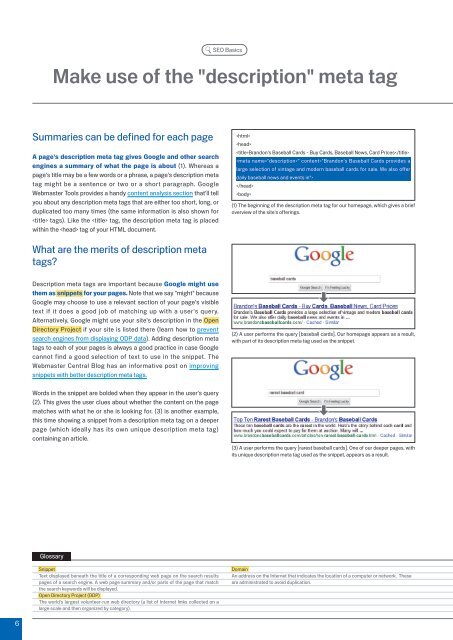Google search engine optimization starter guide
Google search engine optimization starter guide
Google search engine optimization starter guide
Create successful ePaper yourself
Turn your PDF publications into a flip-book with our unique Google optimized e-Paper software.
6<br />
SEO Basics<br />
Make use of the "description" meta tag<br />
Summaries can be defined for each page<br />
A page's description meta tag gives <strong>Google</strong> and other <strong>search</strong><br />
<strong>engine</strong>s a summary of what the page is about (1). Whereas a<br />
page's title may be a few words or a phrase, a page's description meta<br />
tag might be a sentence or two or a short paragraph. <strong>Google</strong><br />
Webmaster Tools provides a handy content analysis section that'll tell<br />
you about any description meta tags that are either too short, long, or<br />
duplicated too many times (the same information is also shown for<br />
tags). Like the tag, the description meta tag is placed<br />
within the tag of your HTML document.<br />
What are the merits of description meta<br />
tags?<br />
Description meta tags are important because <strong>Google</strong> might use<br />
them as snippets for your pages. Note that we say "might" because<br />
<strong>Google</strong> may choose to use a relevant section of your page's visible<br />
text if it does a good job of matching up with a user's query.<br />
Alternatively, <strong>Google</strong> might use your site's description in the Open<br />
Directory Project if your site is listed there (learn how to prevent<br />
<strong>search</strong> <strong>engine</strong>s from displaying ODP data). Adding description meta<br />
tags to each of your pages is always a good practice in case <strong>Google</strong><br />
cannot find a good selection of text to use in the snippet. The<br />
Webmaster Central Blog has an informative post on improving<br />
snippets with better description meta tags.<br />
Words in the snippet are bolded when they appear in the user's query<br />
( ). This gives the user clues about whether the content on the page<br />
matches with what he or she is looking for. ( ) is another example,<br />
this time showing a snippet from a description meta tag on a deeper<br />
page (which ideally has its own unique description meta tag)<br />
containing an article.<br />
Glossary<br />
Snippet<br />
Text displayed beneath the title of a corresponding web page on the <strong>search</strong> results<br />
pages of a <strong>search</strong> <strong>engine</strong>. A web page summary and/or parts of the page that match<br />
the <strong>search</strong> keywords will be displayed.<br />
Open Directory Project (ODP)<br />
The world's largest volunteer-run web directory (a list of Internet links collected on a<br />
large scale and then organized by category).<br />
<br />
<br />
Brandon's Baseball Cards - Buy Cards, Baseball News, Card Prices<br />
<br />
<br />
<br />
(1) The beginning of the description meta tag for our homepage, which gives a brief<br />
overview of the site's offerings.<br />
( ) A user performs the query [baseball cards]. Our homepage appears as a result,<br />
with part of its description meta tag used as the snippet.<br />
( ) A user performs the query [rarest baseball cards]. One of our deeper pages, with<br />
its unique description meta tag used as the snippet, appears as a result.<br />
Domain<br />
An address on the Internet that indicates the location of a computer or network. These<br />
are administrated to avoid duplication.

















